
Guests
- Peter Beinarteditor-at-large at Jewish Currents and a professor at the Newmark School of Journalism at the City University of New York.
Israeli Prime Minister Benjamin Netanyahu is meeting with U.S. President Donald Trump this week in Washington, D.C. Trump and Netanyahu are discussing Israel’s war in Gaza, with Netanyahu suggesting that new plans for the forced relocation of refugees to other countries would give Palestinians the “freedom” to choose. But what Palestinians actually want is “the freedom to return to the places from which their families were expelled,” says Peter Beinart, editor-at-large at Jewish Currents and the author of Being Jewish After the Destruction of Gaza. “What kind of freedom is it when you have an area where most of the buildings and the hospitals and the schools and the bakeries and the agriculture have all been destroyed, where you have more child amputees than any other place on Earth?”
Transcript
AMY GOODMAN: This is Democracy Now!, democracynow.org, The War and Peace Report. I’m Amy Goodman, with Juan González.
Israeli Prime Minister Netanyahu is in Washington this week. On Monday, he met with President Trump and other officials at the White House for their third face-to-face meeting since Trump’s new term. Ahead of dinner, Prime Minister Netanyahu told a reporter Israel and the U.S. are speaking to third countries about relocating Palestinians from Gaza. Netanyahu said it would give Palestinians free choice.
PRIME MINISTER BENJAMIN NETANYAHU: I think President Trump had a brilliant vision. It’s called free choice. You know, if people want to stay, they can stay. But if they want to leave, they should be able to leave. It shouldn’t be a, you know, prison, should be an open place and give people free choice. We’re working with the United States very closely about finding countries that will seek to realize what they always say, that they want to give the Palestinians a better future. And those who — and I think we’re — we’re getting close to finding several countries. And I think this will give, again, the freedom to choose. Palestinians should have it. And I hope that we can secure it.
AMY GOODMAN: That’s Netanyahu, the Israeli prime minister, saying Palestinians should have the freedom to choose. He wasn’t talking about a two-state solution or a one-state solution. He was talking about leaving.
Netanyahu also took the opportunity to announce he has nominated President Trump for the Nobel Peace Prize and presented him with a nominating letter. The audio is a little bit hard to hear, so listen carefully.
PRIME MINISTER BENJAMIN NETANYAHU: So, I want to present to you, Mr. President, the letter I sent to the Nobel Prize Committee. It’s nominating you for the peace prize, which is well deserved, and you should get it.
PRESIDENT DONALD TRUMP: Thank you very much. This I didn’t know. Wow. Thank you very much.
AMY GOODMAN: That was Prime Minister Netanyahu presenting President Trump with the letter he sent to the Nobel Prize Committee nominating him for the peace prize. Hopes around the world are high a ceasefire in Gaza could come out of this week’s talks.
Outside the White House, though, demonstrators gathered to protest the visit of Netanyahu, who’s been accused of war crimes by the International Criminal Court, as well as U.S. support for the war in Gaza.
PROTESTERS: No justice, no peace! No justice, no peace! Get this war criminal out of our streets! Get this war criminal out of our streets! Say it loud, and say it clear! Say it loud, and say it clear! Bibi, you’re not welcome here!
MEGAN DIDAVI: I can’t stand the fact that people are suffering and being killed the way they are. It’s unbelievable that this is happening in this day and age. And I feel helpless, and I feel like our country is hijacked by people who want this to continue and are making it possible. And that’s not what I want my tax dollars to go to.
AMY GOODMAN: To discuss U.S.-Israel relations and more, we’re joined by Peter Beinart. He is an editor-at-large at Jewish Currents. His most recent book, Being Jewish After the Destruction of Gaza. He’s also a professor at the Newmark School of Journalism at the City University of New York. His new opinion piece for The New York Times is headlined “Democrats Need to Understand That Opinions on Israel Are Changing Fast.” He joins us here in our New York studio.
So, first, Peter, if you can start off by responding to this third little summit in Washington between Trump and Netanyahu, where Trump is saying that with the negotiators in Doha, Hamas and Israel, and his meetings with Netanyahu, that they are close to a 60-day ceasefire, what this means, and Netanyahu talking about finding the third country where they will relocate Palestinians to, and assuring people that they have freedom to choose?
PETER BEINART: Right. This freedom — phrase “freedom to choose” is so Orwellian. First of all, what kind of freedom is it when you have a territory where most of the buildings and the hospitals and the schools and the bakeries and the agriculture have all been destroyed, where you have more child amputees than any other place on Earth? And now you’re talking about people’s freedom to choose?
The deeper irony is that Palestinians have actually been — in Gaza and beyond, have been asking for the freedom to choose, the real freedom to choose, since 1948, because the vast majority of Palestinians in Gaza are not from Gaza. They were expelled from their homes in what’s now Israel. Many of them can see the lands from which they were — their families were expelled in 1948. So, they do want the freedom to choose. They want the freedom to return to the places from which their families were expelled.
But that’s, of course, not the freedom they’re being offered. The freedom they’re being offered is to be made refugees again, because Gaza has been utterly destroyed, to go to some other place around the world so Israel can continue this process of ethnic cleansing.
JUAN GONZÁLEZ: And, Peter, the fact that here we see Netanyahu for the third time, this week, coming to the United States, the idea that even Democrats would meet with a leader who’s — who the International Criminal Court has issued an arrest warrant for, your reaction?
PETER BEINART: It is really remarkable. I mean, the line from the Biden administration was that the Democratic Party believed in the rules-based international order. The United States actually worked with the International Criminal Court on the indictment of Vladimir Putin. So, here you have Benjamin Netanyahu having been indicted by the International Criminal Court. Even some of America’s partners in Europe have said that because they believe in international law, they would carry out that arrest warrant. In the United States, instead, Netanyahu is celebrated in a largely bipartisan way, including by Democrats, even though the man has been indicted as a war criminal by the International Criminal Court. What does it say about the Democratic Party’s stated belief in the rules-based international order and human rights, that they would do such a thing?
JUAN GONZÁLEZ: And could you talk about the growing opposition to Netanyahu’s government within Israel, and many believing that he’s continuing these armed conflicts precisely to prevent his day of reckoning in the Israeli courts and among the Israeli people?
PETER BEINART: Well, I think something may have changed here now. I think it is widely believed in Israel that he was continuing this assault on Gaza, because if it ended, it would be clear that Israel had not achieved its goal, it had not destroyed Hamas, and then his government would fall apart, and he would go to elections, which many thought he would lose. I think what has shifted is, since Israel’s bombing of Lebanon and Syria and Iran, Netanyahu’s popularity has increased. He may now believe that he can agree to a ceasefire, even though it will be clear that the war has failed, that Hamas is not actually destroyed and defeated, but because of his — because what he did in Iran and Lebanon and Syria is popular, that he may be able to go to an election and think he can win. That, I think, is the reason that there could be a ceasefire now.


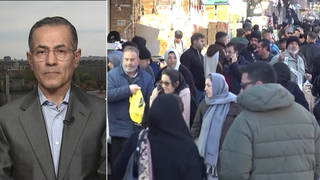
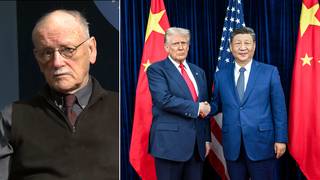

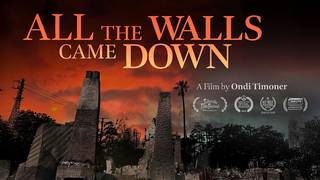
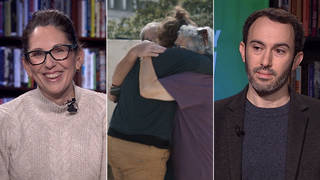
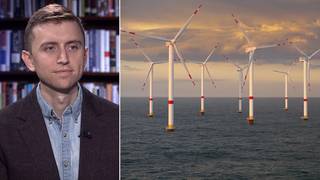


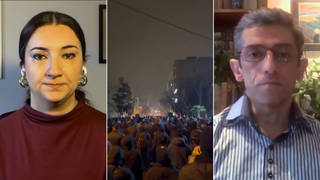
Media Options